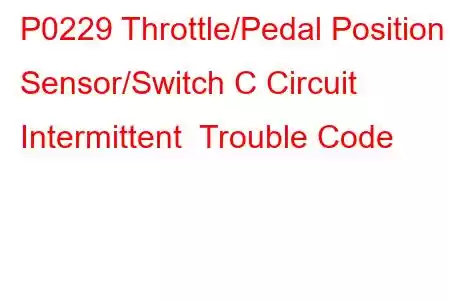P0229 Throttle Position Sensor/Switch C Circuit Intermittent
OBD-II Trouble Code Technical Description
Throttle Position Sensor/Switch C Circuit Intermittent
What does that mean?
This diagnostic trouble code (DTC) is a generic powertrain code, which means that it applies to all 1996-newer vehicles (Dodge, Chrysler, Hyundai, Jeep, Mazda, etc.). Although generic, the specific repair steps may vary depending on make/model.
In my own personal experience, I have found that a stored P0229 code means that the powertrain control module (PCM) has detected an intermittent malfunction in the circuit for the "C" throttle position sensor (TPS) circuit.
The TPS is typically a potentiometer type sensor that completes a five-volt reference circuit. The TPS is mechanically actuated using an extension of the throttle plate shaft or a specially designed tab on the sensor. As the throttle is opened and closed, contacts in the sensor are dragged across a circuit board, varying sensor resistance. As sensor resistance is changed, TPS circuit voltage fluctuates. The PCM recognizes these fluctuations as varying degrees of throttle plate actuation.
The PCM uses input voltage signals from the TPS to calculate fuel delivery and ignition timing. It also uses TPS input data to monitor intake air flow, exhaust oxygen content, exhaust gas recirculation (EGR) function, and engine load percentage.
If the PCM detects a certain number of intermittent or erratic signals from the TPS, over a set period of time, and under a programmed set of circumstances, a code P0229 will be stored and a malfunction indicator lamp (MIL) may be illuminated.
Severity & Symptoms
The TPS plays an important role in engine drivability, therefore a stored code P0229 should be addressed with some degree of urgency.
Symptoms of a P0229 code may include:
Hesitation upon acceleration Black smoke from engine exhaust (especially on start up) Delayed engine startup (particularly on cold start) Diminished fuel efficiency Stored emissions related codes may accompany a P0229Causes
Possible causes for this engine code include:
Defective or misadjusted TPS Open or shorted TPS "C" wiring or connectors Binding or damaged throttle plate Bad PCM or a PCM programming errorDiagnostic and Repair Procedures
A good starting point is always to check for technical service bulletins (TSB) for your particular vehicle. Your issue may be a known issue with a known fix put out by the manufacturer and can save you time and money during diagnosis.
I typically use a diagnostic scanner, a digital volt/ohmmeter (DVOM), and an accurate vehicle information source (ALL DATA DIY) to diagnose a code P0229.
A successful diagnosis usually begins with a visual inspection of all system related wiring and connectors. I also like to test the throttle plate for signs of carbon coking or damage. Repair or replace defective wiring or components as required, then recheck the throttle body and TPS.
Connect the scanner to the diagnostic connector; retrieve all stored trouble codes and write them down for future reference. I also keep any related freeze frame data. My notes are often helpful if the stored code proves to be intermittent. Next, I would clear the codes and test-drive the vehicle. Continue with the diagnosis if the code is reset. If it is not reset, the condition may need to worsen before a correct diagnosis can be made. Operate the vehicle normally until the PCM enters readiness mode or the code is reset.
Proceed by checking for technical service bulletins (TSB) that apply to the particular malfunction (and vehicle) in question by consulting your vehicle information source. If applicable, use the information contained in the appropriate TSB to help with your diagnosis. TSBs can be especially helpful when diagnosing a
Read: 44


